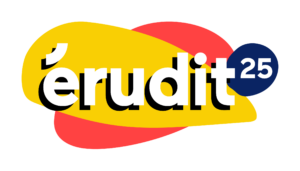
A look back at the success of a local platform providing access to research, disseminating journals and promoting French-language knowledge
Montreal, September 18, 2023 – This fall, the Quebec-born Érudit Consortium will celebrate its 25th anniversary. This is an opportunity for the platform to reflect on how far it has come, to appreciate the value of this unique tool, and to reaffirm its commitment to open-access publishing.
Originally a university pilot project, Érudit has become Canada’s leading dissemination platform for scholarly articles in the humanities and social sciences. Over 10,000 articles are disseminated each year on the erudit.org online platform, from over 300 independent journals. This research treasure trove serves as a refreshing counterbalance to major commercial scientific publishers.
Pioneer in online dissemination of knowledge
The first version of erudit.org was launched in 1998, just as the Internet was becoming widely accessible. Print journals were reflecting on how they would fit into the digital world, the scope of which was impossible to predict. Érudit was born, making five academic journals available for free to Internet users worldwide. The initiative was a success, and the platform went on to be administered, as of 2004, by an inter-university consortium comprised of the Université de Montréal, Université Laval and Université du Québec à Montréal. The Consortium has continued to expand its offering to include a wide range of research from Quebec, Canada and other countries. Today, Érudit boasts a global reach, an ever-increasing number of visitors, and recognition from major institutions. This success is thanks to the consistent dedication and hard work of the platform’s founders, partners—particularly academic journals—and teams.
Making research more discoverable
The free dissemination of research is highly beneficial not only to the academic and scientific community, but also to the general public. As competition grows among various types of content, as misinformation continues to spread, and as a number of media outlets become increasingly fragile, the ability to easily retrieve relevant articles has become essential for education and for democratic life.

“The discoverability of the thousands of articles disseminated through our platform relies on our teams’ expertise, from text digitization to search engine optimization. It also relies on our model of equitable, non-commercial open access,” said Tanja Niemann, Executive Director of Érudit.
Journals: promoting knowledge diversity and open access to research
As part of its anniversary celebration, the platform expresses its commitment to Quebec’s scholarly and cultural journals, and to the dissemination of science in French, regardless of subject or theme. The dissemination of works and studies conceived and written in French is a valuable contribution to bibliodiversity, in the spirit of epistemic justice.
“A knowledge society can only exist if knowledge is shared generously and widely. The research disseminated through Érudit helps local and international communities thrive intellectually, socially and economically,” said Frédéric Bouchard, Dean of the Faculty of Arts and Sciences at the Université de Montréal and Chairman of the Board of Directors at Érudit. “Examples include recent studies on school dropouts, Indigenous history and the effects of climate change.Thanks to the work carried out by the Érudit team behind the scenes, along with the erudit.org platform’s usability and the richness of its content, research specialists and the public alike can find and read reliable, high-quality information.”

In response to pressure from large commercial platforms, the open-access movement was prompted some 20 years ago, leading to major changes in the scientific publishing landscape.

“As the open-access movement gains momentum, knowledge dissemination remains a central issue in today’s scientific debate,” said Vincent Larivière, holder of the first UNESCO Chair in Open Science, and Scientific Director of Érudit. “Open access is a wonderful opportunity to democratize knowledge, but a tremendous challenge for local academic journals, which often operate on smaller budgets.”
Over the past 25 years, Érudit has proven to be a key player in the dissemination of open knowledge, and there is every reason to believe that such a tool will become all the more strategically important in years to come. Coalition Publica is a pan-Canadian partnership between Érudit and the Public Knowledge Project that is spearheading this expansion of services to communities across the country, in both French and English.
As part of its anniversary celebration, Érudit will also be taking part in a series of events this fall, including International Open Access Week (October 23–29, 2023) and the Semaine mondiale de la Francophonie scientifique (October 30–November 3, 2023).